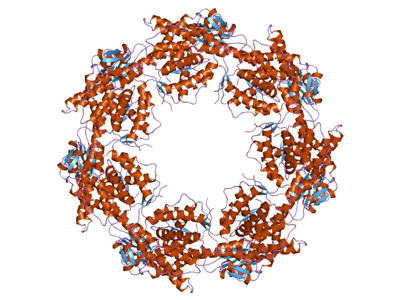The scientific journal PloS ONE has just published a report by Prof. Jonas Blomberg and colleagues at the University of Uppsala in Sweden who, with funding from ME Research UK and others, have been looking for evidence of persistent or past infection in people with ME/CFS. A majority of ME/CFS patients can point to an acute, infectious-like episode as the start of their illness, so scientific investigation into infection and its role in initiating or maintaining illness is particularly important.
Their paper describes the identification of antibodies to heat shock protein 60 (HSP60), one of a number of “stress proteins” produced when cells undergo physiological stresses (e.g. excessive heat, disease, or infection). It seems that HSP60 is an element of the ‘cascade’ of danger signals which results in an immune response by the body. In a complicated series of experiments on blood sera from ME/CFS patients, other patients (including people with MS or systemic lupus) and healthy blood donors, the researchers measured immune responses to HSP60 peptides obtained from different kinds of infectious agents. Their main finding was that levels of antibodies to specific parts of HSP60 were relatively high, both in ME/CFS patients and in control samples. However, significant levels of antibodies to Chlamydia pneumoniae-derived HSP60 were present in around a quarter (24.6%) of ME/CFS patients – a far higher proportion than in the patients with other illnesses (0.003%). While the precise meaning of this finding is unclear at present, and much more work remains to be done, it is possible that immune responses to certain synthetic HSP60 peptides will come to have a role as biomarkers of ME/CFS – at least in a subset of patients.
[Image: HSP60’s bacterial homolog (groEL), courtesy of European Bioinformatics Institute]
Abstract of paper
Myalgic encephalomyelitis (ME, also called Chronic Fatigue Syndrome), a common disease with chronic fatigability, cognitive dysfunction and myalgia of unknown etiology, often starts with an infection. The chaperonin human heat shock protein 60 (HSP60) occurs in mitochondria and in bacteria, is highly conserved, antigenic and a major autoantigen. The anti-HSP60 humoral (IgG and IgM) immune response was studied in 69 ME patients and 76 blood donors (BD) (the Training set) with recombinant human and E coli HSP60, and 136 30-mer overlapping and targeted peptides from HSP60 of humans, Chlamydia, Mycoplasma and 26 other species in a multiplex suspension array. Peptides from HSP60 helix I had a chaperonin-like activity, but these and other HSP60 peptides also bound IgG and IgM with an ME preference, theoretically indicating a competition between HSP60 function and antibody binding. A HSP60-based panel of 25 antigens was selected. When evaluated with 61 other ME and 399 non-ME samples (331 BD, 20 Multiple Sclerosis and 48 Systemic Lupus Erythematosus patients), a peptide from Chlamydia pneumoniae HSP60 detected IgM in 15 of 61 (24%) of ME, and in 1 of 399 non-ME at a high cutoff (p<0.0001). IgM to specific cross-reactive epitopes of human and microbial HSP60 occurs in a subset of ME, compatible with infection-induced autoimmunity.
Reference: Elfaitouri A, et al. Epitopes of microbial and human heat shock protein 60 and their recognition in myalgic encephalomyelitis. PLoS ONE 2013; 8(11): e81155
Funding: Funded by ME research UK and the Olle Engkvist Foundation. The funders had no role in study design, data collection and analysis, decision to publish, or preparation of the manuscript.




